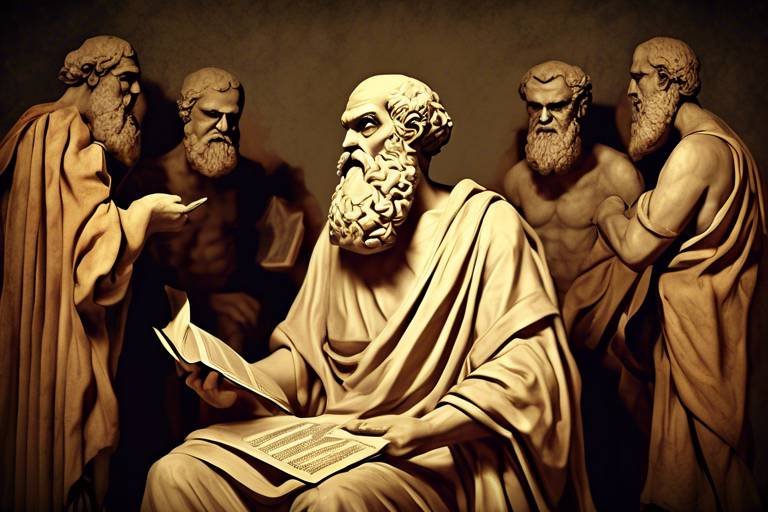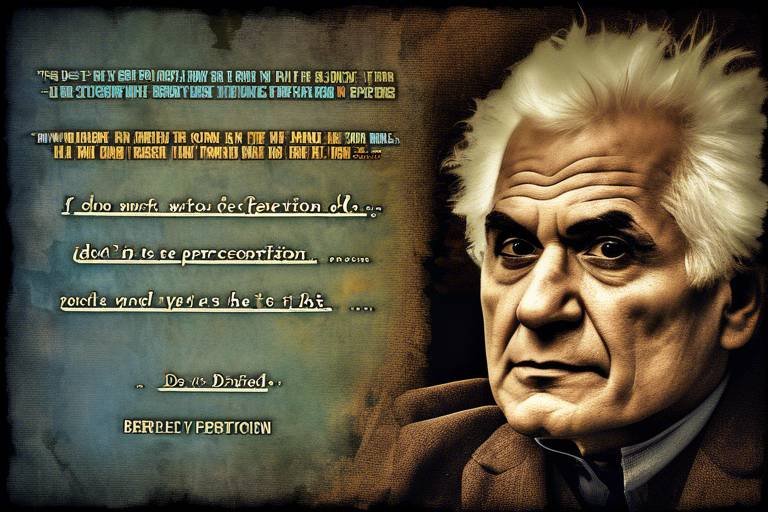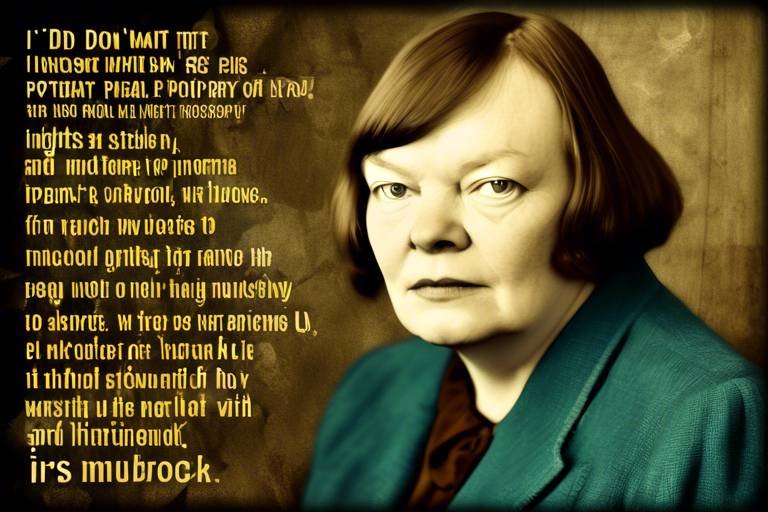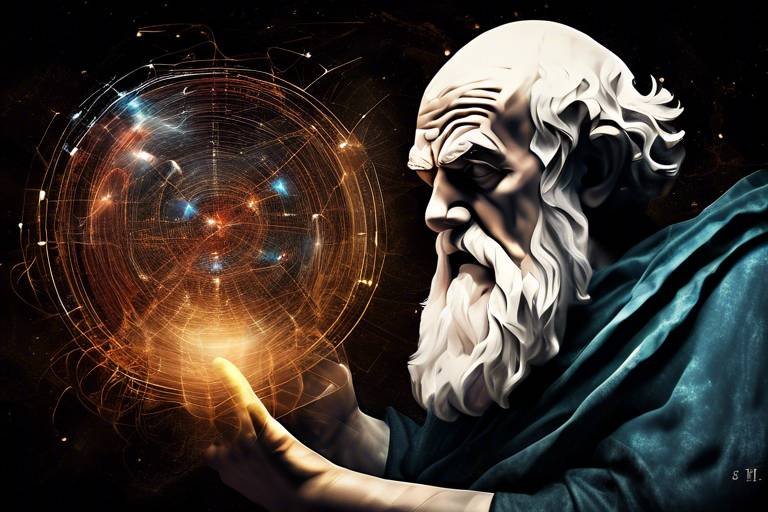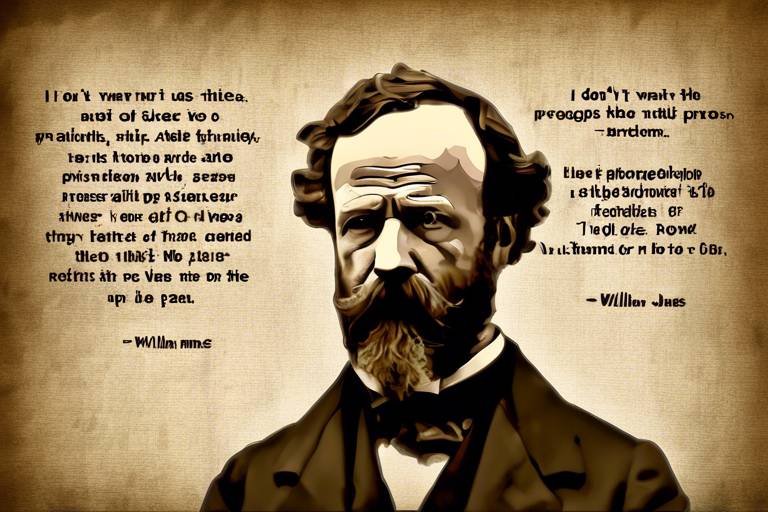Exploring the Philosophies of the Pre-Socratics
The Pre-Socratic philosophers are like the unsung heroes of Western thought, paving the way for generations of thinkers who would follow in their footsteps. These early Greek philosophers, active before Socrates, were on a quest to understand the universe in a way that was radically different from the mythological explanations that dominated their time. They sought to peel back the layers of existence, probing into the nature of reality, the cosmos, and the fundamental principles that govern life. Imagine standing at the edge of a vast ocean, peering into the depths of the water, trying to fathom what lies beneath the surface. This is precisely what the Pre-Socratics did with their inquiries into existence. They were not merely content with accepting the world as it was presented to them; instead, they challenged the status quo, asking profound questions that would shape the future of philosophy.
During a time when the ancient Greeks were deeply intertwined with mythology, the Pre-Socratics embarked on a journey of rational inquiry. They began to observe the world around them, seeking natural explanations for phenomena rather than attributing everything to the whims of gods and goddesses. This shift in thought was monumental, marking the transition from mythos to logos, from storytelling to reasoning. Their ideas were not just abstract musings; they laid the groundwork for various fields such as science, mathematics, and ethics. By stepping away from mythological narratives, these thinkers opened the door to a new way of understanding the world—one based on observation, logic, and evidence.
In this exploration, we will delve into the lives and philosophies of some of the most influential Pre-Socratic thinkers. From the water-loving Thales of Miletus to the enigmatic Heraclitus, who famously claimed that "everything flows," each philosopher brought a unique perspective to the table. They tackled questions about the nature of existence, the essence of reality, and the fundamental building blocks of the universe. Their ideas may seem distant from our modern understanding, yet they resonate through the ages, echoing in the thoughts of contemporary philosophers and scientists alike.
Let’s take a moment to appreciate the sheer audacity of these thinkers. They were like explorers setting sail into uncharted waters, armed only with their curiosity and a desire to uncover the mysteries of life. They ventured beyond the familiar shores of myth and superstition, forging paths that would lead to groundbreaking discoveries in philosophy and science. As we journey through their philosophies, we will see how they not only questioned the world around them but also influenced future generations of thinkers, including Socrates, Plato, and Aristotle.
As we dive deeper into the philosophies of the Pre-Socratics, we will examine their contributions to cosmology, the nature of existence, and the fundamental principles that govern the universe. We will explore how their ideas have shaped our understanding of reality and continue to inspire philosophical discourse today. So, buckle up as we embark on this intellectual adventure, tracing the roots of Western philosophy back to its very beginnings!
- Who were the Pre-Socratic philosophers? The Pre-Socratic philosophers were early Greek thinkers who lived before Socrates and sought to understand the universe through rational inquiry rather than mythology.
- What is the significance of Pre-Socratic philosophy? Pre-Socratic philosophy marks a crucial transition from mythological explanations of the world to logical reasoning, laying the groundwork for future philosophical and scientific thought.
- What were the main themes explored by the Pre-Socratics? The Pre-Socratics explored themes such as the nature of existence, the cosmos, and the fundamental principles governing reality, often focusing on natural explanations for phenomena.
- Which philosophers are considered Pre-Socratics? Key figures include Thales, Anaximander, Heraclitus, and Pythagoras, among others, each contributing unique ideas to early philosophical discourse.

Introduction to Pre-Socratic Philosophy
The Pre-Socratic philosophers, emerging in ancient Greece before the time of Socrates, represent a pivotal shift in human thought. They dared to challenge the traditional mythological narratives that explained the world around them, opting instead for a more rational and systematic approach to understanding existence. This transition marked the dawn of philosophical inquiry as we know it today. Imagine standing at the edge of a vast ocean, where the waves of mythology crash against the shores of reason; the Pre-Socratics were the first to dip their toes into these uncharted waters, seeking to uncover the underlying principles that govern the cosmos.
Historically, these thinkers appeared during a time when Greek society was undergoing significant changes. The rise of city-states and increasing trade led to new ideas and cultural exchanges, creating a fertile ground for intellectual exploration. The Pre-Socratics sought to answer profound questions about the nature of reality, existence, and the universe, laying the groundwork for future philosophical discourse. They were like the early explorers of thought, navigating the seas of knowledge with little more than their curiosity and intellect as their guides.
Among their many contributions, the Pre-Socratics introduced concepts that would resonate through the ages. They asked questions such as: What is the fundamental substance of reality? How do change and stability coexist? and What is the nature of the cosmos? Their inquiries paved the way for later philosophers, influencing figures like Plato and Aristotle, who would build upon their ideas. The Pre-Socratics were not just thinkers; they were the architects of a new way of understanding the world, challenging the status quo and inspiring generations to come.
In essence, the significance of Pre-Socratic philosophy lies in its departure from mythological explanations. Instead of attributing natural phenomena to the whims of gods, these early philosophers sought to uncover the natural laws that govern the universe. This shift towards rational inquiry not only transformed philosophical thought but also laid the foundation for the scientific method we rely on today. They were the first to ask, "Why?" and "How?" in a world that had previously accepted "Because the gods say so" as an answer.
As we delve deeper into the ideas of key figures like Thales, Anaximander, and Heraclitus, we will see how their unique contributions shaped early philosophical discourse and set the stage for future explorations into the nature of existence. Their thoughts were like seeds planted in the rich soil of human inquiry, which would eventually grow into the vast tree of Western philosophy. So, let’s embark on this journey through time and explore the fascinating world of Pre-Socratic philosophy!
- Who were the Pre-Socratic philosophers? The Pre-Socratic philosophers were early Greek thinkers who lived before Socrates, focusing on rational explanations of the universe rather than mythological narratives.
- What did the Pre-Socratics contribute to philosophy? They introduced fundamental questions about existence, nature, and the cosmos, laying the groundwork for Western philosophy.
- Why are they important? Their shift from mythological to rational explanations marked a significant turning point in human thought, influencing future philosophers and the development of science.

Key Figures of the Pre-Socratics
The Pre-Socratic philosophers were a fascinating bunch, each with their own unique ideas that helped to shape the very fabric of Western thought. These thinkers were bold enough to step away from traditional mythological narratives and instead sought to understand the world through reason and observation. It's like they took a leap of faith into the unknown, armed only with their curiosity and intellect. Among these early philosophers, a few stand out due to their remarkable contributions, which transformed the landscape of philosophy and science.
First up is Thales of Miletus, often hailed as the first philosopher in history. Thales had a knack for simplifying complex ideas, famously positing that water is the fundamental substance of all things. Imagine that! He believed everything around us—plants, animals, even the earth itself—was ultimately derived from water. This radical notion not only paved the way for future naturalistic explanations but also showcased Thales' prowess in mathematics and astronomy. He was the first to predict a solar eclipse, which is no small feat! Thales' ability to blend observation with logical reasoning was revolutionary, setting the stage for subsequent thinkers.
Next, we have Anaximander, a student of Thales who took his teacher's ideas a step further. Anaximander introduced the concept of the apeiron, or the "infinite," suggesting that this boundless entity is the source of all things. Picture it as an endless ocean from which everything emerges and to which everything returns. This idea was groundbreaking because it hinted at a more abstract understanding of existence, moving beyond tangible elements like water. Anaximander's cosmology laid the groundwork for future explorations into the nature of the universe, challenging us to think about existence in a more profound way.
Then there's Heraclitus, known for his enigmatic assertion that "everything flows." Heraclitus believed that change is the only constant in life, which can feel like a comforting truth in our ever-evolving world. He famously stated, "You cannot step into the same river twice," emphasizing the transient nature of reality. His philosophy of the unity of opposites suggests that contradictions are essential for balance in the universe. Think of it like a dance—light and dark, joy and sorrow, all intertwined in a beautiful, chaotic rhythm. Heraclitus' insights into change and permanence have influenced countless thinkers throughout history, resonating even in modern philosophical discourse.
Another significant figure is the Pythagorean School, founded by Pythagoras. While he is best known for his contributions to mathematics, particularly the Pythagorean theorem, his philosophical views were equally profound. The Pythagoreans believed that numbers are the essence of all things and that understanding the universe requires a grasp of numerical relationships and harmony. They saw mathematics not just as a tool but as a way to comprehend the very fabric of reality. Imagine the universe as a grand symphony, with numbers playing the notes that create harmony and order. This perspective deeply influenced later philosophical and scientific thought, intertwining mathematics with metaphysical inquiries.
In summary, the Pre-Socratic philosophers were trailblazers who dared to ask fundamental questions about existence, nature, and the cosmos. Their innovative ideas set the stage for future philosophical inquiry and scientific exploration. The impact of figures like Thales, Anaximander, Heraclitus, and the Pythagoreans cannot be overstated; they opened the door to a new way of thinking that continues to resonate in our understanding of the world today.
- Who were the Pre-Socratic philosophers?
The Pre-Socratic philosophers were early Greek thinkers who explored fundamental questions about existence and nature before Socrates. They sought rational explanations for the universe, moving away from mythological narratives. - What is the significance of Thales?
Thales is often considered the first philosopher for proposing that water is the fundamental substance of all things, marking a shift toward naturalistic explanations. - What did Heraclitus mean by "everything flows"?
Heraclitus emphasized the idea that change is constant in life, suggesting that nothing remains the same, and that opposites are interconnected. - How did Pythagoras contribute to philosophy?
Pythagoras combined mathematics with philosophy, positing that numbers and their relationships are key to understanding the universe.

Thales of Miletus
Thales of Miletus is often heralded as the first philosopher in Western history, and for good reason. He lived around 624-546 BCE in the ancient city of Miletus, located in what is now Turkey. Thales was not just a thinker; he was a pioneer who dared to step away from mythological explanations of the world. Instead of attributing natural phenomena to the whims of gods, he sought to understand the underlying principles governing existence. It’s like he took a giant leap from the shadows of superstition into the bright light of rational inquiry, illuminating the path for future philosophers.
At the core of Thales' philosophy is his assertion that **water** is the fundamental substance of all things. This idea might seem simplistic today, but it was revolutionary at the time. Thales believed that everything in the universe is connected through this one substance. Imagine a vast web where every thread is made of water, linking everything from the smallest pebble to the largest mountain. This notion laid the groundwork for later philosophical explorations into the nature of matter and existence. His belief in a single underlying principle also hinted at the idea of unity in diversity, a theme that would echo through the ages.
In addition to his philosophical contributions, Thales was also a significant figure in mathematics and astronomy. He is credited with several important discoveries, such as the concept that a circle is bisected by its diameter and the ability to predict a solar eclipse. Picture him standing under the vast sky, gazing at the stars, and calculating celestial movements with the precision of a skilled artisan. Thales' work in these areas showcased his belief that the universe operates according to rational laws, a radical departure from the chaotic views of earlier thinkers.
To sum it up, Thales of Miletus was not just a philosopher; he was a **trailblazer** who set the stage for future intellectual pursuits. His ideas about water as the essence of all things and his mathematical and astronomical insights mark him as a key figure in the evolution of philosophy. His legacy is not just in what he discovered but in the very act of questioning the world around him, inspiring countless others to do the same.

Anaximander's Cosmology
Anaximander, a pivotal figure in early Greek philosophy, introduced a radical concept that would influence countless thinkers after him: the apeiron, or the infinite. Imagine standing at the edge of a vast ocean, where the horizon seems to stretch into eternity; this is the essence of the apeiron—an endless, boundless source from which all things arise and to which they return. Anaximander proposed that the universe originated from this primordial substance, suggesting that everything we see around us is merely a manifestation of this infinite reality.
His cosmological views were not just abstract thoughts; they were grounded in a profound understanding of nature. Anaximander believed that the cosmos was not static but rather a dynamic entity, constantly in flux. He posited that the apeiron was eternal and ageless, contrasting sharply with the transient nature of the material world. This idea resonates with the modern scientific notion that the universe is ever-expanding and evolving, demonstrating how forward-thinking Anaximander was for his time.
In addition to his groundbreaking ideas about the apeiron, Anaximander also made significant contributions to our understanding of the cosmos through his theories of cosmology. He was one of the first to suggest that the Earth floats freely in space, unsupported by anything—a revolutionary thought that challenged the prevailing beliefs of his day. This idea can be likened to a child’s balloon suspended in mid-air, defying gravity, which was a radical departure from the notion that the Earth was flat or held up by other objects.
To further illustrate his cosmological framework, Anaximander proposed that the universe is governed by a principle he called justice (or cosmos), which maintains balance among the opposing forces. He believed that everything in existence is subject to a cycle of birth, growth, decay, and rebirth, much like the changing seasons. This cyclical nature of existence reflects a deep understanding of the interconnectedness of all things, a theme that resonates through many philosophical traditions.
In summary, Anaximander's contributions to cosmology were not merely philosophical musings; they laid the groundwork for future inquiries into the nature of existence. His ideas about the apeiron and the dynamic, cyclical nature of the universe invite us to ponder our place within this infinite cosmos. Just as a river flows endlessly, so too do Anaximander's thoughts continue to inspire and challenge our understanding of the universe.
- What is the apeiron? The apeiron is the concept introduced by Anaximander, referring to the infinite or boundless source from which all things originate.
- How did Anaximander view the Earth? Anaximander proposed that the Earth floats freely in space, which was a significant departure from the beliefs of his time.
- What role does justice play in Anaximander's cosmology? Anaximander believed that justice governs the universe, maintaining balance among opposing forces and ensuring the cyclical nature of existence.

apeiron
The Pre-Socratic philosophers were the trailblazers of Western thought, stepping away from mythological explanations and diving into the depths of rational inquiry. These thinkers, active before Socrates, laid the groundwork for future philosophical discourse, shaping how we ponder existence, nature, and the cosmos. Their ideas were revolutionary, setting the stage for a new era of intellectual exploration.
Among the prominent figures of this era, Thales, Anaximander, and Heraclitus stand out for their unique contributions. Each philosopher brought forth ideas that challenged the status quo, igniting discussions that would echo through the ages. Let’s dive deeper into their philosophies and understand how they influenced the course of thought.
Thales is often considered the first philosopher, a title that carries immense weight. He posited that water is the fundamental substance of all things, suggesting that everything in the universe is interconnected through this vital element. Beyond his philosophical insights, Thales also made significant contributions to mathematics and astronomy, illustrating the blend of science and philosophy that characterized the Pre-Socratic era.
Anaximander introduced the concept of the , or the infinite, which marked a significant shift in philosophical thought. He proposed that the apeiron is the source of all things, a boundless entity from which everything emerges and eventually returns. This notion was radical for its time, as it moved away from the idea of a specific elemental origin, like water or earth, suggesting instead that existence itself is rooted in an indefinable, limitless principle. Anaximander's views on the cosmos and existence have inspired countless debates, raising questions about the nature of reality and the origins of the universe.
Heraclitus is famous for his assertion that everything flows, capturing the essence of change in the universe. He believed in the unity of opposites, where contrasting forces coexist and contribute to the harmony of existence. His philosophy emphasizes that the only constant in life is change itself, a concept that resonates deeply in our modern understanding of the world.
The Pythagoreans combined mathematics with philosophy, asserting that numbers and harmony are fundamental to understanding the universe. Their belief in the mystical properties of numbers paved the way for future mathematical and philosophical explorations.
Pre-Socratic thinkers approached the cosmos with a sense of wonder, theorizing about its nature and fundamental principles. They sought to explain the universe not through mythology but through observation and reason, laying the foundation for scientific inquiry.
Empedocles proposed that all matter is composed of four elements: earth, water, air, and fire. His theories on change and the cyclical nature of existence highlight the interconnectedness of these elements in the grand tapestry of life.
Democritus introduced the idea of atoms as the building blocks of matter, presenting a materialistic view of the universe that would influence later philosophical thought. His insights into the nature of reality paved the way for modern science.
- Who were the Pre-Socratic philosophers? The Pre-Socratic philosophers were early Greek thinkers who explored fundamental questions about existence, nature, and the cosmos before the time of Socrates.
- What is the apeiron? The apeiron, introduced by Anaximander, refers to the infinite or boundless principle from which all things arise and to which they return.
- Why is Heraclitus famous? Heraclitus is known for his assertion that "everything flows," emphasizing the constant state of change in the universe and the unity of opposites.
- What contributions did Pythagoreans make? The Pythagoreans combined mathematics with philosophy, highlighting the significance of numbers and harmony in understanding the universe.
- How did Democritus influence modern thought? Democritus's idea of atomism laid the groundwork for materialistic views of the universe, influencing both philosophy and science.

or the infinite. This part examines his views on the origin of the cosmos and the nature of existence.
Anaximander, a pioneering thinker in the realm of pre-Socratic philosophy, introduced a revolutionary concept that has intrigued scholars for centuries: the apeiron, often translated as "the infinite" or "the boundless." This idea marked a significant departure from the tangible elements that earlier philosophers, like Thales, proposed as the essence of existence. Rather than identifying a specific substance, Anaximander posited that the source of all things is something beyond our comprehension, a limitless expanse that gives rise to the cosmos and everything within it.
To grasp Anaximander's vision, one must consider how he viewed the universe. He believed that the cosmos is not a static entity but rather a dynamic and evolving system. The apeiron serves as the primordial substance from which all things emerge and to which they ultimately return. Imagine the universe as a vast ocean, where waves represent the different forms of existence. Each wave rises and falls, yet the ocean itself remains constant and infinite. This metaphor encapsulates Anaximander's belief in the cyclical nature of existence, where creation and destruction are intertwined in a perpetual dance.
In his pursuit of understanding the cosmos, Anaximander also proposed that the universe is governed by a principle he called justice or cosmic order. This principle ensures that all things are in balance, and any excess or deficiency is corrected over time. For instance, when a fire burns too brightly, it eventually diminishes, restoring equilibrium. This idea of balance resonates with modern scientific principles, where systems strive for homeostasis. Anaximander's insights into the nature of existence paved the way for future philosophical inquiries, influencing thinkers such as Plato and Aristotle.
| Key Concepts of Anaximander | Description |
|---|---|
| Apeiron | The infinite source of all things, beyond human comprehension. |
| Cosmic Order | The principle of balance and justice that governs the universe. |
| Cyclical Nature | The belief that all things emerge from and return to the apeiron. |
In summary, Anaximander's exploration of the apeiron not only deepened our understanding of the cosmos but also laid the groundwork for subsequent philosophical thought. His ideas challenge us to look beyond the surface of reality and ponder the infinite possibilities that lie beneath. As we continue to explore the mysteries of existence, Anaximander's legacy remains a guiding light, reminding us of the boundless nature of our universe.
- What is the apeiron? The apeiron is a concept introduced by Anaximander, representing the infinite or boundless source of all things in the universe.
- How did Anaximander influence later philosophers? Anaximander's ideas about the nature of existence and cosmic order influenced thinkers like Plato and Aristotle, shaping the foundation of Western philosophy.
- What does Anaximander's cosmology tell us about change? Anaximander believed in the cyclical nature of existence, where all things emerge from and return to the apeiron, emphasizing the dynamic and ever-evolving character of the universe.

Heraclitus and Change
Heraclitus, often referred to as the "Obscure," was a philosopher from Ephesus who introduced profound ideas about the nature of change. His famous assertion that "everything flows" encapsulates his belief that change is the only constant in the universe. Imagine standing by a river; while you may see the same water flowing past, it's never truly the same water twice. This metaphor perfectly illustrates Heraclitus's perspective on reality. He viewed the world as a dynamic entity, where stability is merely an illusion. In his eyes, everything is in a state of flux, and this perpetual change is what defines existence.
Heraclitus took a unique approach to understanding the cosmos. He believed that opposites are essential for harmony, famously stating that "strife is justice." This idea suggests that conflict and contradiction are not only inevitable but necessary for balance. Think of it like a dance; the interplay between light and dark, joy and sorrow, creates a rhythm that is both beautiful and essential. For Heraclitus, the unity of opposites is what drives the world forward, a concept that resonates deeply in various fields, from philosophy to modern science.
One of his key contributions was the notion of the "logos," a term that refers to the underlying order and reason that governs the cosmos. Heraclitus believed that while everything is in constant change, there is a rational structure to this chaos. It’s as if the universe is a grand symphony, where each note, no matter how discordant it may seem, plays a crucial role in the overall composition. This idea of logos would later influence many philosophical schools, including Stoicism and even early Christian thought.
Heraclitus also emphasized the importance of understanding the transient nature of life. He argued that by recognizing the impermanence of our surroundings, we can better appreciate the moments we have. This perspective encourages a deeper engagement with life, prompting us to cherish experiences rather than cling to them. In a world that often prioritizes stability and permanence, Heraclitus reminds us that embracing change is vital for growth and understanding.
In summary, Heraclitus's philosophy revolves around the concept of change as a fundamental aspect of existence. His insights into the unity of opposites and the idea of logos provide a framework for understanding the complexity of the universe. By accepting that everything is in flux, we can navigate our lives with greater awareness and appreciation for the beauty that change brings.
- What is the main idea behind Heraclitus's philosophy?
Heraclitus believed that change is the only constant in the universe, encapsulated in his famous phrase "everything flows." - How did Heraclitus view opposites?
He saw opposites as essential for balance and harmony, suggesting that conflict is necessary for the order of the cosmos. - What does the term "logos" mean in Heraclitus's philosophy?
Logos refers to the rational order and reason that governs the universe, indicating that while everything is changing, there is an underlying structure to this chaos. - How can Heraclitus's ideas be applied to modern life?
His insights encourage us to embrace change and appreciate the transient nature of life, promoting a deeper engagement with our experiences.

everything flows.
The Pre-Socratic philosophers were the trailblazers of Western thought, marking a significant shift from mythological explanations of the world to a more rational and inquiry-based approach. These thinkers, who lived before Socrates, sought to understand the fundamental nature of reality, existence, and the cosmos. Their ideas laid the groundwork for future philosophical discourse, influencing countless generations. By pondering questions about the universe and our place within it, they opened the door to a new way of thinking that still resonates today.
Among the most influential figures of this era were Thales, Anaximander, and Heraclitus. Each of these philosophers contributed uniquely to the evolution of thought, challenging the status quo and encouraging others to question their surroundings. Their ideas were not just academic pursuits; they were reflections of humanity's quest for understanding in a chaotic world.
Thales is often considered the first philosopher, a title he earned through his groundbreaking ideas. He believed that water was the fundamental substance of all things, suggesting that everything in existence is derived from this essential element. His inquiries didn't stop at metaphysics; he also made significant contributions to mathematics and astronomy, laying the foundations for these disciplines. Thales' approach exemplified the shift from myth to reason, illustrating how early thinkers began to seek explanations grounded in observation and logic.
Anaximander introduced the concept of the apeiron, or the infinite, as the source of all things. This notion was revolutionary, suggesting that the cosmos originated from something boundless and undefined. His views on existence and the nature of the universe paved the way for later philosophical inquiries, emphasizing the complexity and interconnectedness of all things.
Heraclitus is famous for his assertion that everything flows. This profound statement captures the essence of his philosophy: change is the only constant in the universe. According to Heraclitus, life is a dynamic process where opposites are interconnected, and stability is merely an illusion. He believed that understanding the unity of opposites is crucial for grasping the nature of reality. For instance, consider the duality of day and night; one cannot exist without the other. This interplay of forces reflects the ever-changing nature of existence, where everything is in a state of flux. Heraclitus' emphasis on change serves as a reminder that life is not static and that embracing transformation is essential for growth.
The Pythagoreans combined mathematics with philosophy, believing that numbers and harmony were fundamental to understanding the universe. Their insights into the relationships between numbers and the cosmos influenced later philosophical thought and scientific inquiry.
Pre-Socratic thinkers approached the cosmos with a sense of wonder and curiosity, exploring various theories about the nature of the universe and its fundamental principles. Their ideas challenged conventional wisdom and paved the way for a more scientific understanding of existence.
Empedocles proposed that all matter is composed of four elements: earth, water, air, and fire. His theories on change and the cyclical nature of existence were groundbreaking, suggesting that these elements interact in a continuous process of creation and destruction.
Democritus introduced the idea of atoms as the building blocks of matter. His materialistic view of the universe had significant implications for later philosophical thought, laying the groundwork for modern science.
- What is Pre-Socratic philosophy?
Pre-Socratic philosophy refers to the early Greek thinkers who explored fundamental questions about existence, nature, and the cosmos before the time of Socrates.
- Why is Heraclitus famous for saying "everything flows"?
Heraclitus emphasized the idea that change is constant in the universe, highlighting the dynamic nature of reality.
- What contributions did Pythagoreans make to philosophy?
The Pythagoreans integrated mathematics and philosophy, believing that numbers and harmony were essential to understanding the universe.

This section discusses his philosophy of change and the unity of opposites, emphasizing the transient nature of reality.
Heraclitus, often hailed as the "Weeping Philosopher," had a profound understanding of the world that resonates even today. His famous declaration that “everything flows” encapsulates his belief in the constant state of change that defines our existence. Imagine standing by a river; the water that touches your feet is never the same as the water that flows a moment later. This metaphor perfectly illustrates Heraclitus's view that change is not only inevitable but is the very essence of life itself. He argued that permanence is an illusion, and everything is in a state of flux. This idea challenges us to reconsider our perceptions of stability and permanence in our daily lives.
Moreover, Heraclitus introduced the concept of the unity of opposites, suggesting that opposites are interconnected and that their tension is what drives the world forward. For instance, think of how day and night are two opposing forces that create the rhythm of time. Without darkness, we wouldn't appreciate the light, and vice versa. This interplay of opposites is fundamental in understanding the universe's nature. Heraclitus famously stated that “strife is justice”, highlighting that conflict and contrast are not merely obstacles to harmony but are essential to its existence.
His philosophy urges us to embrace the transient nature of reality. In a world that often seeks certainty and stability, Heraclitus reminds us that the only constant is change itself. This perspective can be liberating; it encourages us to adapt and grow, rather than resist the inevitable shifts in our lives. By recognizing that change is a natural part of existence, we can learn to navigate life's challenges with greater resilience and acceptance.
To further illustrate Heraclitus's thoughts, consider the following table that summarizes his key ideas:
| Concept | Description |
|---|---|
| Everything Flows | Life is in a constant state of change; nothing remains the same. |
| Unity of Opposites | Opposites are interconnected and essential for harmony. |
| Transient Nature of Reality | Embrace change as a natural part of existence. |
In summary, Heraclitus's insights into change and the unity of opposites provide a profound framework for understanding the complexities of life. By accepting that change is the only constant and that opposites coexist in a delicate balance, we can cultivate a deeper appreciation for the world around us. His philosophy encourages us to be adaptable and to find meaning in the dynamic nature of our experiences.
- What is the main idea of Heraclitus's philosophy? Heraclitus believed in the constant state of change in the universe and the unity of opposites.
- How does Heraclitus's view of change relate to everyday life? His philosophy encourages us to embrace change and adapt to life's challenges, recognizing that nothing remains static.
- What does "everything flows" mean? It signifies that all things are in a continual state of flux, similar to how a river's water is never the same from moment to moment.

Pythagorean Contributions
The Pythagoreans, a group founded by the enigmatic philosopher Pythagoras, were not just mathematicians; they were also profound thinkers who intertwined mathematics with philosophy, spirituality, and the very fabric of the universe. Imagine walking through a world where numbers are not merely tools for counting but the underlying principles governing all existence. This was the essence of Pythagorean thought. They believed that numbers held the keys to understanding the cosmos, and through their mathematical insights, they sought to uncover the fundamental truths of reality.
At the heart of Pythagorean philosophy lies the idea of harmony. Just as a symphony is composed of various notes that come together to create beautiful music, the Pythagoreans posited that the universe is structured in a harmonious way, dictated by numerical relationships. For them, numbers were not just abstract concepts; they were the essence of all things. The Pythagorean theorem, which many of us learned in school, is just the tip of the iceberg. This theorem, which relates the sides of a right triangle, reflects a deeper truth about the interconnectedness of space and form.
But what exactly did the Pythagoreans contribute to philosophy and science? Here are some key points:
- Mathematical Mysticism: The Pythagoreans believed that numbers had mystical properties and that they could explain the universe's nature. For instance, they found significance in the number 10, which they considered the "perfect number" because it is the sum of the first four integers (1 + 2 + 3 + 4).
- Harmony and Proportion: They studied the relationships between different musical notes and discovered that harmonious sounds correspond to simple numerical ratios. This idea of harmony extended beyond music into the realms of nature and the cosmos.
- Influence on Later Philosophers: The Pythagorean emphasis on mathematics as a pathway to understanding reality influenced many later philosophers, including Plato, who integrated their ideas into his own philosophical system.
Furthermore, the Pythagorean belief in the transmigration of souls—the idea that the soul is immortal and undergoes a cycle of rebirth—adds a spiritual dimension to their philosophy. This belief not only shaped their ethical views but also emphasized the importance of living a life in pursuit of knowledge and virtue. They saw philosophy as a way to achieve a higher understanding of the universe and our place within it.
In essence, the Pythagorean contributions were groundbreaking. They transformed the abstract concept of numbers into a profound philosophy that sought to explain the universe. Their legacy is still felt today, as we continue to explore the mathematical principles that govern our world. The Pythagoreans remind us that there is a deeper connection between mathematics and the very essence of existence, encouraging us to look beyond the surface and seek the underlying truths that shape our reality.

Cosmology and Nature
When we think about the cosmos, it’s easy to get lost in the vastness of it all. The Pre-Socratic philosophers were among the first to attempt to understand the universe not just through myths and legends, but through observation and rational thought. They moved away from attributing natural phenomena to the whims of gods and instead sought to uncover the fundamental principles that govern everything around us. This shift was revolutionary, akin to switching on a light in a dark room, illuminating the path for future generations of thinkers.
One of the most captivating aspects of Pre-Socratic cosmology is their exploration of the nature of existence itself. They pondered questions like: What is the universe made of? How did it come to be? And what are the underlying forces that drive change and stability? These early philosophers laid the groundwork for a more scientific approach to understanding the world, which would eventually evolve into the fields of physics and metaphysics. Their inquiries can be seen as the first steps towards a more profound comprehension of nature, akin to a child taking their first steps—awkward yet full of potential.
Among the notable contributions to cosmology was the idea of elements as the building blocks of everything. Empedocles, for instance, proposed that all matter is composed of four fundamental elements: earth, water, air, and fire. This theory not only emphasized the interconnectedness of these elements but also highlighted the cyclical nature of existence, suggesting that these elements are in a constant state of flux. Imagine a dance where each element plays its part, sometimes leading and sometimes following, creating a harmonious balance that sustains life.
Moreover, the Pre-Socratics were not just theorists; they were also keen observers of the natural world. They sought to explain phenomena like lightning, earthquakes, and the changing seasons through natural laws rather than supernatural explanations. This approach can be likened to a detective unraveling a mystery, piecing together clues to form a coherent narrative. Their work encouraged future philosophers to adopt a more empirical approach, paving the way for the scientific method we cherish today.
Another significant figure in this quest for understanding was Democritus, who introduced the concept of atomism. He proposed that everything in the universe is composed of tiny, indivisible particles called atoms. This idea was groundbreaking, as it suggested that the universe is fundamentally material and that all phenomena can be explained through the interactions of these atoms. Imagine a grand symphony where each atom is a note, and together they create the rich tapestry of existence. Democritus’s materialistic view provided a foundation for later philosophical thought and scientific inquiry, influencing thinkers like Epicurus and even modern science.
In summary, the Pre-Socratic philosophers made remarkable strides in understanding the cosmos and nature. Their inquiries into the fundamental elements, the nature of existence, and the principles governing the universe were not just philosophical musings; they were profound insights that shaped the trajectory of Western thought. Their legacy can be seen in the way we approach questions about the universe today, as we continue to seek answers through observation, experimentation, and rational discourse.
- What is Pre-Socratic philosophy? Pre-Socratic philosophy refers to the ideas and thoughts of early Greek philosophers who lived before Socrates, focusing on the nature of existence, the cosmos, and the principles governing the universe.
- Who were the key figures in Pre-Socratic philosophy? Key figures include Thales, Anaximander, Heraclitus, Empedocles, and Democritus, each contributing unique ideas that shaped early philosophical discourse.
- What was the significance of atomism? Atomism, introduced by Democritus, proposed that everything is made of indivisible particles called atoms, laying the groundwork for materialistic views of the universe and influencing later scientific thought.
- How did Pre-Socratic philosophers change our understanding of nature? They shifted the focus from mythological explanations to rational inquiry, encouraging a more empirical approach to understanding natural phenomena.

Empedocles and the Four Elements
Empedocles, a philosopher from the ancient city of Akragas in Sicily, is renowned for his groundbreaking theory that all matter is composed of four fundamental elements: earth, water, air, and fire. Imagine these elements as the building blocks of everything around us, each playing a unique role in the grand tapestry of existence. This idea was revolutionary for its time, moving away from the singular substance theories proposed by earlier thinkers like Thales, who posited that water was the essence of all things.
What makes Empedocles' theory particularly fascinating is his belief in the cyclical nature of existence. He proposed that these four elements are constantly interacting through two opposing forces he called Love and Strife. Love brings elements together, creating unity and harmony, while Strife separates them, leading to chaos and disarray. This dynamic interplay can be likened to a dance, where the rhythm of Love and Strife dictates the flow of creation and destruction in the universe.
To better understand Empedocles' contributions, let's break down the four elements and their significance:
| Element | Characteristics | Symbolism |
|---|---|---|
| Earth | Solid, stable, and nurturing | Foundation, growth, and fertility |
| Water | Fluid, adaptable, and life-giving | Emotion, intuition, and purification |
| Air | Invisible, essential, and dynamic | Communication, intellect, and freedom |
| Fire | Transformative, energetic, and consuming | Passion, destruction, and renewal |
This table illustrates how each element contributes to the complexity of the natural world. Empedocles' notion that these elements could combine and separate in various ways laid the groundwork for later scientific thought. His ideas paved the way for a more systematic understanding of nature, influencing not only philosophy but also the fields of chemistry and physics.
Moreover, Empedocles' thoughts on the cyclical nature of existence resonate with many aspects of life. Just as seasons change, so too do the elements interact and transform, reflecting the impermanence inherent in nature. His view encourages a holistic perspective, suggesting that everything is interconnected in a grand cosmic cycle. This idea can be seen as a precursor to modern ecological thought, where balance and interdependence are crucial for sustainability.
In conclusion, Empedocles' exploration of the four elements and their interactions offers profound insights into the nature of reality. His philosophical contributions not only enriched the discourse of his time but also provided a framework that would influence countless generations of thinkers. By shifting the focus from singular substances to a more dynamic interplay of elements, Empedocles helped to shape the very foundations of Western philosophy and science.
- What are the four elements according to Empedocles?
Empedocles proposed that all matter is made up of earth, water, air, and fire. - What roles do Love and Strife play in Empedocles' philosophy?
Love brings elements together, while Strife separates them, creating a cycle of unity and chaos. - How did Empedocles influence later philosophical thought?
His ideas about the elements and their interactions laid the groundwork for future scientific theories and a more systematic understanding of nature.

Democritus and Atomism
Democritus, often hailed as the father of atomism, was a thinker who dared to venture into the realm of the unseen, proposing that everything in the universe is made up of tiny, indivisible particles called atoms. Imagine for a moment that the world around you is like a vast ocean, and these atoms are the tiny droplets that make up the waves. Each atom, according to Democritus, is unique and varies in shape, size, and arrangement, contributing to the diversity we observe in the material world. This revolutionary idea was a significant departure from the more mystical explanations of existence that preceded him.
What makes Democritus's theory particularly fascinating is its materialistic view of the universe. He posited that everything, from the air we breathe to the stars in the sky, is composed of these tiny particles, which are in constant motion. This motion, akin to a never-ending dance, gives rise to the phenomena we experience in our daily lives. In this sense, Democritus was not just a philosopher; he was a precursor to modern science, laying the groundwork for future explorations into the nature of matter.
To better understand Democritus's contributions, let's break down some of his key ideas:
- Indivisibility: Democritus argued that atoms cannot be divided further, making them the ultimate building blocks of matter.
- Variety of Atoms: He believed that different types of atoms combine in various ways to create all known substances.
- Void: Democritus introduced the concept of the void, a space where atoms exist and move freely, which was essential for explaining motion and change.
One of the most intriguing aspects of Democritus's atomism is its implications for understanding the cosmos. He viewed the universe as a vast, infinite expanse filled with an infinite number of atoms, constantly interacting and rearranging themselves. This perspective not only challenged the existing philosophical norms but also paved the way for a more scientific approach to understanding nature. In a way, he was like a cosmic architect, envisioning a universe built from the simplest elements, yet capable of producing the most complex forms.
Despite the brilliance of his ideas, it’s important to note that Democritus's theories were not widely accepted in his time. Many contemporaries favored more spiritual or mythological explanations for the nature of existence. However, as history unfolded, the seeds of his atomistic philosophy would eventually sprout into a full-blown scientific revolution, influencing thinkers like Galileo and Newton. Today, we recognize Democritus not just as a philosopher, but as a pivotal figure in the history of science, whose vision of a materialistic universe continues to resonate with modern scientific thought.
In conclusion, Democritus's exploration of atomism represents a monumental shift in the way we understand the world around us. By proposing that everything is composed of tiny, indivisible particles, he opened the door to a new way of thinking about existence, one grounded in observation and reason rather than myth and speculation. His legacy is a testament to the power of inquiry and the relentless pursuit of knowledge, reminding us that sometimes, the most profound truths lie hidden in the smallest of places.
Frequently Asked Questions
- Who were the Pre-Socratic philosophers?
The Pre-Socratic philosophers were early Greek thinkers who lived before Socrates. They focused on explaining the nature of existence, the cosmos, and the fundamental principles of reality, moving away from mythological explanations towards rational inquiry. Key figures include Thales, Anaximander, Heraclitus, and Pythagoras.
- What did Thales of Miletus believe was the fundamental substance of all things?
Thales is often regarded as the first philosopher and he believed that water was the essential substance that made up everything in the universe. His ideas laid the groundwork for future philosophical and scientific thought, including contributions to mathematics and astronomy.
- What is Anaximander's concept of the apeiron?
Anaximander introduced the idea of the apeiron, which translates to "the infinite" or "the boundless." He theorized that the universe originated from this indefinite substance, which is beyond our comprehension and is the source of all things. This marked a significant shift in cosmological thought.
- How did Heraclitus view change in the universe?
Heraclitus famously stated that "everything flows," highlighting his belief in the constant state of change in the universe. He emphasized the unity of opposites, suggesting that contrary forces are interconnected and necessary for the existence of reality, illustrating the transient nature of life.
- What contributions did the Pythagoreans make to philosophy?
The Pythagoreans were known for their belief in the significance of numbers and their relationship to the universe. They combined mathematics with philosophy, asserting that understanding numerical relationships could lead to a deeper comprehension of harmony and order in the cosmos.
- What are the four elements proposed by Empedocles?
Empedocles proposed that all matter is composed of four fundamental elements: earth, water, air, and fire. He believed that these elements interact in cycles, leading to change and the formation of various substances and phenomena in the universe.
- What is the significance of Democritus's atomism?
Democritus introduced the concept of atoms as the smallest building blocks of matter. His materialistic view suggested that everything in the universe is composed of these indivisible particles, which had profound implications for later scientific and philosophical thought, laying the groundwork for modern atomic theory.



